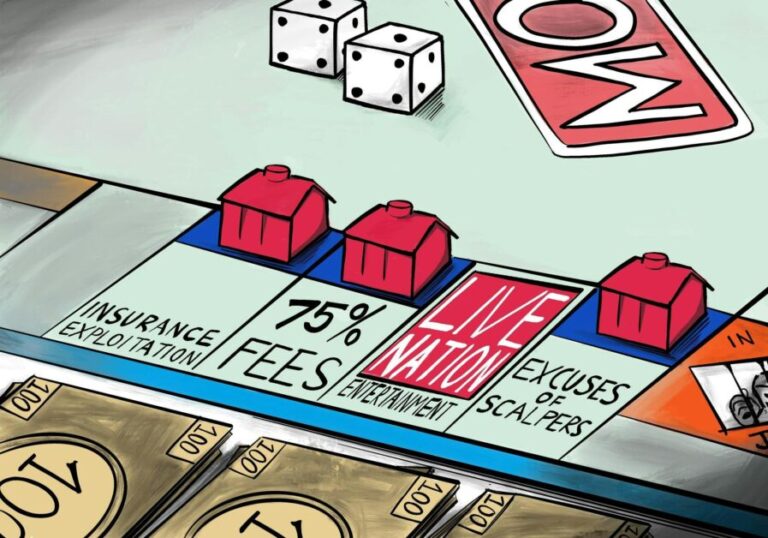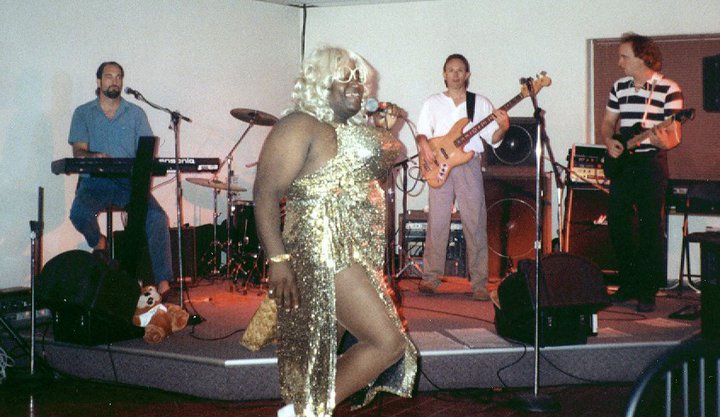The Live Nation-Ticketmaster Monopoly in Canada: A Crisis for Music Fans, Artists, and Venues
The effects of the Live Nation-Ticketmaster monopoly in Canada are felt just as acutely as in the United States, if not more so. With fewer major players in the live music industry, the merger’s dominance has created a system that often feels rigged against fans, artists, and independent venues. From exorbitant fees to scalping scandals, the Canadian live music scene is grappling with the consequences of this corporate stranglehold. Let’s dive into how this monopoly is shaping the Canadian music landscape.

The Canadian Monopoly: Fewer Options, Higher Costs
In Canada, Ticketmaster’s control over ticketing is even more pronounced due to the country’s smaller market. The company holds exclusive contracts with most major venues, including iconic spaces like Toronto’s Scotiabank Arena, Montreal’s Bell Centre, and Vancouver’s Rogers Arena. This means that if you want to see a major artist in Canada, chances are you’ll have to go through Ticketmaster—and pay their infamous fees.
These fees, often referred to as “service charges” or “convenience fees,” can add 30% or more to the face value of a ticket. For example, a $100 ticket can easily balloon to $130 or $140 after fees. In a country where concertgoers already face high travel and accommodation costs (especially in cities like Toronto and Vancouver), these additional fees can make live music inaccessible for many fans.
The Scalping Problem: A Canadian Crisis
Scalping is a massive issue in Canada, and Ticketmaster’s policies have only made it worse. The company’s resale platform, Ticketmaster Resale, allows scalpers to buy up tickets during presales and flip them for astronomical prices. This practice is particularly rampant in Canada, where high demand for concerts often outstrips supply.
One infamous example is the 2023 Drake tour, where tickets for his Canadian shows appeared on resale sites like StubHub and Vivid Seats within minutes of going on sale—often at triple or quadruple the original price. Fans were left furious, while Ticketmaster collected fees on both the initial sale and the resale. The company’s “Verified Fan” program, designed to combat scalping, has been criticized for being ineffective and exclusionary, often locking out longtime fans while still allowing scalpers to thrive.
The Impact on Canadian Artists
For Canadian artists, the Ticketmaster-Live Nation monopoly presents a double-edged sword. On one hand, partnering with Live Nation can provide access to major venues and promotion, which is crucial for artists looking to break into the international market. On the other hand, the terms of these deals often favor the corporation, leaving artists with a smaller share of ticket revenue.
Independent Canadian artists, in particular, face an uphill battle. Without the leverage of a major label or management team, they often have little choice but to accept Live Nation’s terms if they want to play at larger venues. This can make it harder for emerging artists to sustain themselves financially, especially when combined with the high costs of touring in a vast country like Canada.
The Squeeze on Canadian Venues
Independent venues in Canada are also feeling the pressure. Many are locked into exclusive contracts with Ticketmaster, meaning they have no choice but to use their ticketing services, regardless of the cost or the impact on their customers. These contracts often come with steep fees that eat into the venue’s profits, making it harder for smaller, independent spaces to survive.
In cities like Toronto and Vancouver, where real estate costs are already sky-high, this financial strain has led to the closure of beloved local venues. The loss of these spaces not only diminishes the cultural fabric of Canadian cities but also limits opportunities for emerging artists to perform and build their audiences.
The Fan Experience: A Broken System
For Canadian fans, the Ticketmaster-Live Nation monopoly has turned buying tickets into a frustrating and often disheartening experience. The combination of high fees, limited availability, and rampant scalping has made it increasingly difficult for fans to see their favorite artists without breaking the bank.
The problem is exacerbated in smaller Canadian cities, where fewer concerts are scheduled, and demand is even higher. Fans in places like Winnipeg, Halifax, or Regina often have to travel to larger cities for shows, adding travel and accommodation costs to an already expensive ticket. When those tickets are snapped up by scalpers or priced out of reach, it’s a devastating blow to music lovers.
What Can Be Done in Canada?
The Ticketmaster-Live Nation monopoly has drawn criticism from Canadian lawmakers and advocacy groups. In recent years, there have been calls for stricter regulations on ticket resale practices and greater transparency in ticketing fees. Some provinces, like Ontario and Quebec, have introduced legislation aimed at curbing scalping, but enforcement remains a challenge.
Fans can advocate for change by supporting independent venues and artists who bypass the Ticketmaster-Live Nation machine. Platforms like Eventbrite and Showpass offer alternatives for smaller shows, while grassroots initiatives like #FixLiveMusicCA are pushing for systemic change.
Artists, too, have a role to play. Canadian musicians like Neil Young and Arcade Fire have spoken out against the monopoly, and more artists could use their platforms to demand fairer terms and better treatment for fans.
And at the same time we can elect government that regulates these giant corporations and not one that deregulates everything and allow the companies to grow into giant monopolies that exploit everyone for shareholder and CEO profits.
Conclusion
The Ticketmaster-Live Nation monopoly has created a system that prioritizes profits over people, and in Canada, the effects are particularly pronounced. From sky-high fees to scalping scandals, the current state of the live music industry is unsustainable for fans, artists, and venues alike.
But there is hope. By supporting independent venues, advocating for policy changes, and holding corporations accountable, Canadians can help create a more equitable and accessible live music ecosystem. After all, music is a vital part of Canadian culture—it deserves a system that works for everyone, not just the bottom line of a corporate giant.







